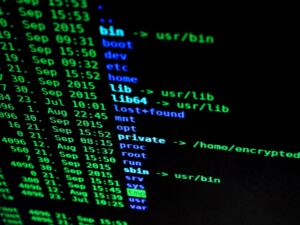 Sometimes I look at the search queries that lead people to this website, and I see something interesting. One day last year, I saw that someone had asked Bing “is hacking a sin in christanity” (sic). I have no idea what that person actually had on their mind—if they were wondering about software piracy, or cheating in a video game, rooting their phone, or penetrating the computer systems at NORAD. All I know is that they were interested in God’s view of hacking. Now, bear in mind that I’m no theologian nor a professional minister. I am just someone with a platform who thinks he has something to say. Maybe it will help somebody.
Sometimes I look at the search queries that lead people to this website, and I see something interesting. One day last year, I saw that someone had asked Bing “is hacking a sin in christanity” (sic). I have no idea what that person actually had on their mind—if they were wondering about software piracy, or cheating in a video game, rooting their phone, or penetrating the computer systems at NORAD. All I know is that they were interested in God’s view of hacking. Now, bear in mind that I’m no theologian nor a professional minister. I am just someone with a platform who thinks he has something to say. Maybe it will help somebody.
 Some time ago, I brought this question to my friends on the Geek at Arms podcast. While Mike and James certainly had many good things to say, I thought that the short amount of time we had to spend on it there cheated us of the opportunity to really consider the question in an organized way. I’d like to start here by repeating a little bit of what Mike said about the nature of sin. He spoke about two views of what sin is: One is that we are in sin when we fail to measure up to God’s standard. Romans 3:23 is the usual verse used to support this idea (though it is not alone): “… all have sinned and fall short of the glory of God” (emphasis mine). This idea of falling short means that we sin simply by not meeting expectations. Sounds like the worst job performance review imaginable. I am truly thankful for the line that follows that one: “all are justified freely by his grace through the redemption that came by Christ Jesus.” The other viewpoint Mike shared is one of willful disobedience to God’s known will, as expressed in James 4:17—”If anyone, then, knows the good they ought to do and doesn’t do it, it is sin for them.”
Some time ago, I brought this question to my friends on the Geek at Arms podcast. While Mike and James certainly had many good things to say, I thought that the short amount of time we had to spend on it there cheated us of the opportunity to really consider the question in an organized way. I’d like to start here by repeating a little bit of what Mike said about the nature of sin. He spoke about two views of what sin is: One is that we are in sin when we fail to measure up to God’s standard. Romans 3:23 is the usual verse used to support this idea (though it is not alone): “… all have sinned and fall short of the glory of God” (emphasis mine). This idea of falling short means that we sin simply by not meeting expectations. Sounds like the worst job performance review imaginable. I am truly thankful for the line that follows that one: “all are justified freely by his grace through the redemption that came by Christ Jesus.” The other viewpoint Mike shared is one of willful disobedience to God’s known will, as expressed in James 4:17—”If anyone, then, knows the good they ought to do and doesn’t do it, it is sin for them.”
Personally, I think both of these senses describe sin. Certainly, there are things that I do not even recognize as wrong that still “miss the mark” of God’s perfect standards. There are ideas and attitudes that are not in line with what He wants, and those things are sinful, whether I am aware of them or not. There are also things that I do that I know He does not want me to do, and whether or not I can point to a Bible verse forbidding them, they are still sins.
So to bring this back around to hacking—using these criteria of “Does it meet God’s standard of behavior?” and “Do I really know this is wrong?”, we can look at the various activities we call “hacking” to determine if they are, in fact, sinful.
As I alluded to above, and as we talked about in the podcast, there are a variety of things that people mean by the term hacking. You can go to a dictionary and get “using a computer to gain unauthorized access to data in a system” or “riding a horse for pleasure.” (Google define:) I think we can safely set aside that second one. Other definitions include “the intellectual challenge of creatively overcoming limitations of software systems to achieve novel and clever outcomes.” (Wikipedia) I’d like to start with that last one.
Hacking and the Maker Movement
There is a particular subculture that is concerned with invention and modification to technology. Here in the United States, it is frequently dubbed the “Maker Movement.” It includes people who make fighting robots in their garages or build quadcopters shaped like a Star Destroyer. It includes people who jailbreak phones and turn toasters into video game controllers. I have no idea what made that guy want to do that, though I suppose there would be a certain appropriateness to using it to play Battlestar Galactica Deadlock. In this sense, I think that hacking is usually not only acceptable but even a way we can become a little more Christlike.
Our chaplain said in his Faith and Gaming article “Settings” that by the time God created Man “in His own image,” (Genesis 1:26) He had done only two things: Create stuff and call it good. It is reasonable to think, then, that these qualities of creativity and appreciation are part of that image of God that defines us as human beings. We are most like our Creator when we invent. Jesus’ first recorded miracle in John 2 involved Jesus “hacking” the water at the wedding feast, turning it into wine. In his book God in the Dock (and I think also in Miracles), C.S. Lewis points out that grapevines turn water into wine all the time; they simply do it more slowly—Jesus just skipped to the end.
I don’t think there is anything sinful about repurposing a device to do something it was never designed to do. I think that it’s a way of enjoying the world God has made for us and participating in the joy He experiences in that creation.
There is, however, the matter of licensing. Whether or not you think that the software on your phone should belong to you rather than to Apple, the law disagrees. And as Christians, we are bound to obey the laws of the nations where we reside (Romans 13). If we are to subject ourselves to governing authorities, and those authorities dictate that it is against the law to root your iPad, then doing so may well be a sin. I’ll admit that’s a moving target, though. What’s illegal one year might be permitted the next. And take note that it isn’t the actual act that is wrong, but the violation of the law.
Software Piracy
Following on from my previous point, regardless of whether you consider piracy “stealing,” it’s indisputably against the law, and therefore wrong. I’m not going to get into the various studies that have been done on either side of the piracy debate. Depending on where you draw the lines and how you define results, you can prove pretty much anything you want. I believe Mark Twain had something to say about lies and statistics. I will say, though, that I am a professional computer graphics artist, and my livelihood depends on my employers being paid for our work. You may think that the big studios and publishers don’t deserve your money, but take a moment to think about all of us working stiffs who do deserve to get paid for our labors.
Fair Use Copies
U.S. copyright law permits the creation of archival copies of media you own. DRM technology, while designed to prevent unauthorized distribution, has the side effect of preventing you from making lawful copies. With that in mind, it may be legally permissible to disable copy protection for that purpose (but don’t cite me in the lawsuit—I Am Not A Lawyer). If you have the capability and inclination to do so, then it’s going to come down to a matter of your own conscience—if you believe that making a copy is against the law, then it is sinful for you to do so.
Unauthorized Mods
In the olden days, game designers didn’t include mechanisms for mod creation. These days, many games come with creation kits and modding manuals, but there are still some that don’t. The assumption is sometimes made that if modding tools are not provided, then modding the game goes against the intent of the designers. But does the intent of the designer have any bearing on whether or not it is ethical or moral to hack in a modification? Are the creator’s rights being violated in some way by the existence of a mod?
These questions are not as straightforward as they appear. We want to say, “No, of course we’re not violating Nintendo’s rights by modding Legend of Zelda!” But let’s look at the matter in terms of a different medium: Books. I was going to reference the mess surrounding Marion Zimmer Bradley’s cancelled novel Contraband, but since I can’t really make heads or tails of that situation, I’ll leave it as an exercise for the reader to look it up. The eventual outcome, though, was that several authors were advised by their lawyers that the existence of fan fiction was a threat to their copyrights. Whether or not that is actually true has never been tested in court, as far as I am aware. Nevertheless, there might be a legal foundation for claims that mods of a video game fall into a similar category. At the very least, there is precedent for video game publishers suing the creators of mods and modding tools that they believe harm the value of their games. Specifically, Take Two successfully shut down a company that made modding tools for Grand Theft Auto, and Blizzard won a judgement against a company that made cheat mods for Overwatch and World of Warcraft. There are obviously some other intricacies involved in both of those situations, but they clearly indicate that some forms of modification are, in fact, out of bounds.
I would like to also consider the matter of moral rights. An artist has the right in some jurisdictions to prevent the use of their work in ways that might harm their reputation. For instance, Core Design might have had a case against the makers of the “Nude Raider” mod, which removed Lara Croft’s clothing, on the grounds that the mod subverted their property into pornography. They did send cease and desist letters to the creators of the mod, but I don’t think any legal action was ever initiated.
So in at least some circumstances, a mod can harm a game’s creators. I don’t think that I would be too far out of line to suggest that causing harm to another person for entertainment or profit is sinful. That’s not to say that all unauthorized mod creation is out of bounds, though. Wolfenstein 3D was possibly among the first major titles to be modded, and the fan-created levels for that game vastly increased its value, enough so that Id deliberately built Doom in such a way as to encourage modding. Half Life probably sold more copies for the sake of Counterstrike Beta than it did its original modes. I know I played CS more than I ever did Half Life itself.
It’s not a cut-and-dried question. Consider whether your mod, authorized or not, violates the designer’s moral rights or contributes to harming them or anyone else. When you’ve answered that question, you probably know whether or not it’s sinful.
Cheating
Once again, let’s consider the consequences of the cheat. In multiplayer, cheating is usually a means of gaining superiority over another player, either for self-aggrandizement (pride) or for the fun of discomfiting others (cruelty). I think it’s pretty clear that either of those motives is not Godly. On very rare occasions, I have seen multiplayer cheats used to handicap a skilled player in order to allow less skilled players the chance to compete. The proportions are probably 1000:1, though, so I would say that cheating in multi-player is a big NO.
Cheating in single player is a different matter. Do I sin by turning on God mode? Is that a sentence I ever anticipated getting to write? (Nope!) Typically, the only person you are affecting by cheating in a single-player mode is yourself. I suppose if achievements are something that matter, then cheating to acquire them might, in some hypothetical manner, contribute toward harming someone who is competing with you for them. Personally, I think that’s a bit of a stretch. Games are meant as a way of enjoying ourselves. If you get enjoyment by reducing the difficulty by cheating, then I cannot see the harm. However, I am not the arbiter of wrong and right. I am not aware of any Scripture that addresses the matter, so I am afraid this is an area I’ll have to again leave up to your own conscience.
As with most interesting questions, it’s impossible to give a yes or no answer to a question like “Is hacking a sin?” I know there are plenty of people who like hard and fast rules so they never have to deal with ambiguity, but God appears to trust our judgement a little more than we ourselves do.



is this truth..? I Do wanna exploit but not use it for bad things, i wanna be a good person help others
Just as I’m not the arbiter of right and wrong, I’m not the sole judge of truth. And given that I’m neither a philosopher nor a theologian, my opinions on the matter shouldn’t be given undue weight. I just reread the article, though, and I still think my positions are sound. As with most things in life, you have to carefully weigh your motives, the consequences of your actions, and the legal and social rules that should constrain your behavior, and decide for yourself whether or not what you are doing is good or not. And, of course, consult Scripture to see if God has anything straightforward to say about the matter. Of course, you might have noticed that it’s difficult to get a straight answer from an anthology written millennia ago in three other languages and filled mostly with metaphors and poetry!
Unlike Bryan, it happens that I am both a philosopher and a theologian, albeit not very highly ranked in either field; I’m also not certain what that has to do with the validity of his opinion, but for what it’s worth, what he wrote here seems quite sound to me.
When you say that you want to “exploit but not use it for bad things,” you have me wondering exactly which type of hacking you’re considering. The movies sometimes give us the image of the hacker that breaks into some corporate or government database to uncover secrets that need to be exposed–indeed, we had a famous hacker who was exposing government secrets a few years back. That you want to help others does not necessarily mean that what you’re doing is “good”, and particularly not if it is harming some. We admire the myth of Robin Hood, but if someone today were to stop expensive late model cars on the highways, rob the passengers, and donate the money to food kitchens, we would almost certainly arrest and prosecute that person.
That doesn’t necessarily mean that everything unlawful is always wrong. Protestors in the 1960s violated oppressive laws to call attention to the need to change them, such as riding in the fronts of buses and sitting at lunch counters. It’s called “civil disobedience”. The one rule you need to understand about civil disobedience, though, is when you do the crime you should be prepared to face the penalty. For example, since Lady Godiva there have been stories of persons protesting naked to induce change. Such nudity has been ruled free speech by the Supreme Court, but that doesn’t mean protestors should expect not to be arrested for indecent exposure. http://www.mjyoung.net/weblog/index.php/54-nudity-as-free-speech/